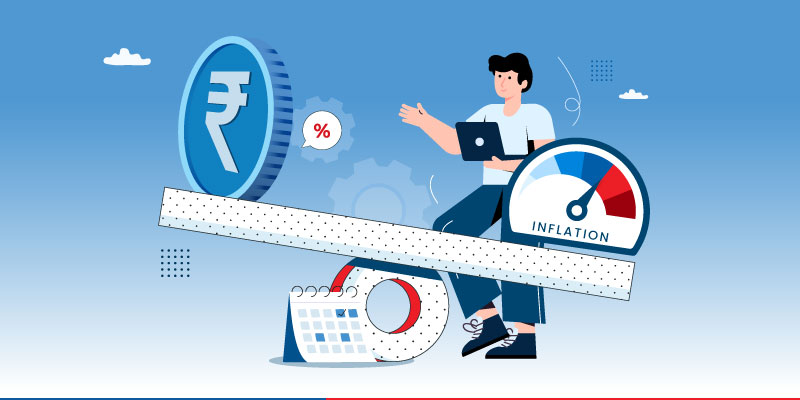What do you want to do?
Understanding inflation and what it means for your investments

We have heard several stories since our childhood about how the prices of everything used to be much lower than what they are right now, in the days of our grandparents. Something that used to cost Rs. 5 in 1950s costs almost 10 times more today, maybe even more. From the genera things of day-to-day requirement to housing, travel, assets etc. - the prices of everything have skyrocketed in the past decades and are increasing even today. The factor that causes this rise in the overall cost of living is known as inflation. Contrary to the popular belief, inflation neither a "modernistic" or post-independence phenomenon, nor is it limited to India or Indian subcontinent. Inflation is a very important factor in every economy, and even though the rates of inflation may vary, the average global trend has always been towards higher inflation.
Measuring inflation is a difficult problem for government statisticians. To do this, a number of goods that are representative of the economy are put together into what is referred to as a "market basket." The cost of this basket is then compared over time. It is a cascaded measurement which then results in a price index, which is the cost of the market basket today as a percentage of the cost of that identical basket in the starting year. In India, there are two major sets of inflation indices that are used to measure price level changes- Wholesale price index (WPI) and the consumer price index (CPI). Additionally, the Gross Domestic Product (GDP) deflator and the Private Final Consumption Expenditure (PFCE) deflator from National Accounts Statistics (NAS) provide the economy-wide inflation estimate on a wider basis.
Now, the impact of inflation on investments can be better understood. Investments are aimed at futuristic predictions and efforts towards increased purchasing power of a person. This simply means that a person invests because of the need of having better capital-at-hand or substantial capital gains in the future (depending on the term and the type of investment). Inflation goes directly against this. Consider this - Investing in shares can be risky because of market volatility, but it remains as one of the more effective ways to beat inflation.
Stocks depend on the performance of its underlying company more than market sentiment, which means a business that thrives may continue to create income for investors. This income may come in the form of share price increases or dividend payouts that can offset inflation.
However, the share market/just like the liquid assets can still be affected negatively by unexpected inflation.
Inflation rates directly affect this purchasing power or the capital gains. This happens because inflation rates vary and impact the prices of things by the time a particular investment matures and starts giving returns.
Understanding the sharp impact of inflation on your money investments is therefore, not just necessary but completely indispensable as well. If not duly taken into account, inflation rates can negate whatever significant capital gains you may have made from your investments.
HDFC Life offers various savings and investment plans that help you create more avenues for capital growth and security of your finances.
 Term Plan Articles
Term Plan Articles
 Investment Articles
Investment Articles
 Savings Articles
Savings Articles
 Life Insurance Articles
Life Insurance Articles
 Tax Articles
Tax Articles
 Retirement Articles
Retirement Articles
 ULIP Articles
ULIP Articles
Subscribe to get the latest articles directly in your inbox
 Health Plans Articles
Health Plans Articles
 Child Plans Articles
Child Plans Articles
 Popular Calculators
Popular Calculators
Here's all you should know about life insurance.
We help you to make informed insurance decisions for a lifetime.
HDFC Life
Reviewed by Life Insurance Experts
HDFC LIFE IS A TRUSTED LIFE INSURANCE PARTNER
We at HDFC Life are committed to offer innovative products and services that enable individuals live a ‘Life of Pride’. For over two decades we have been providing life insurance plans - protection, pension, savings, investment, annuity and health.

Popular Searches
- Term Insurance Calculator
- Investment Plans
- Investment Calculator
- Investment for Beginners
- Best Short Term Investments
- Best Long Term Investments
- 5 year Investment Plan
- savings plan
- ulip plan
- retirement plans
- health plans
- child insurance plans
- group insurance plans
- income tax calculator
- bmi calculator
- compound interest calculator
- income tax slab
- Income Tax Return
- what is term insurance
- Ulip vs SIP
- tax planning for salaried employees
- HRA Calculator
- Annuity From NPS
- Retirement Calculator
- Pension Calculator
- nps vs ppf
- short term investment plans
- safest investment options
- one time investment plans
- types of investments
- best investment options
- best investment options in India
- Term Insurance for Housewife
- Money Back Policy
- 1 Crore Term Insurance
- life Insurance policy
- NPS Calculator
- Savings Calculator
- life Insurance
- Gratuity Calculator
- Zero Cost Term Insurance
- critical illness insurance
- itc claim
- deductions under 80C
- section 80d
- Whole Life Insurance
- benefits of term insurance
- types of life insurance
- types of term insurance
- Benefits of Life Insurance
- Endowment Policy
- Term Insurance for NRI
- Term Insurance for Women
- Term Insurance for Self Employed
- Benefits of Health Insurance
- Health Insurance for Senior Citizens
- Health Insurance for NRI
- Best Term Insurance Plan for 1 Crore
- personal accident insurance
- Annuity Calculator
- Life Insurance Calculator


